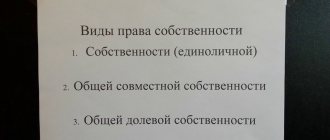Is it possible to challenge the contract and return the purchased home to the seller?
Termination of a contract means the complete termination of its validity and any relationship between its parties. The contract can be terminated only with the consent of the other party or through legal proceedings. The contract is terminated in the same form in which it was created, i.e. in writing .
The purchase and sale transaction of an apartment is considered completed when both parties have fulfilled their obligations, i.e. the apartment is registered in the Unified State Register of Real Estate, and the buyer received an extract from there. The required amount has been paid to the seller.
ATTENTION : If circumstances previously unknown to the parties emerge or one of the parties refuses to fulfill the terms of the agreement, the transaction may be contested. Let us consider in more detail what reasons may serve as the basis for this.
Grounds for cancellation
The conditions on the basis of which a contract for the sale and purchase of an apartment can be terminated are specified in Article 450 of the Civil Code of the Russian Federation . Most often, the parties terminate the contract when some unforeseen circumstances arise that were unknown at the conclusion of the transaction. The consequences of declaring a transaction invalid are considered in Article 167 of the Civil Code of the Russian Federation. Chapter 29 of the Civil Code of the Russian Federation discusses in detail the possibility of terminating the contract and the consequences of this action.
A transaction can be declared invalid in the following cases:
- Significant breach of contract by one of the parties. This may be the buyer’s refusal to pay for the purchased property or the seller’s refusal to vacate the apartment and be deregistered.
- The deal violates Russian legislation.
- The person taking part in the transaction was limited or completely incapacitated.
- One of the participants in the transaction could not be aware of his actions during the transaction (for example, he was under the influence of alcohol).
- A minor took part in the transaction without the consent of his parents and guardianship authorities (we wrote about how to properly sell and buy an apartment if the owner is a minor child here).
- The document was signed under threat. Or the other party to the transaction was provided with false information (about the true condition of the apartment, etc.).
- The transaction was made to cover up another transaction and is imaginary. The parties do not fulfill their obligations in connection with it. There is no correspondence between the transaction and its legal consequences. During the trial, it will be necessary to establish which transaction is covered by an imaginary one.
- An encumbrance has been placed on the property.
- The consent of the third party entitled to the apartment was not obtained. For example, the consent of the spouse was not obtained. You cannot sell an apartment purchased during marriage if the second spouse is against it. This applies even if the spouses have already divorced. Or the bank intervenes if the apartment was purchased with a mortgage and the loan is not repaid. It is also prohibited to sell an apartment in which a minor is registered unless there is appropriate consent from the guardianship and trusteeship authorities.
- The special clauses specified when drawing up the contract were violated.
Extrajudicial procedure for the return of a purchased or sold apartment
If the apartment has already been registered as the buyer's property, non-judicial return of the apartment is possible only if both parties agree to the return.
In this case, you need to draw up an agreement or contract and again submit documents for registration to the same registration authority. If you do everything thoughtlessly, you will have to pay taxes, and possibly on every action. We need to think about other options. Perhaps a judicial recognition of the transaction as invalid will relieve some of the problems. If the apartment has not yet been registered (for example, you have just deposited the money in a safe deposit box), you can try to win it all back. True, you may have to pay a penalty... and certain compensation to the persons involved in the transaction.
Return the apartment to the developer at the last stage of construction
possible if the Developer violates contractual terms or by mutual agreement of the parties. During “real estate crises”, when prices for unfinished apartments under a shared participation agreement in construction are higher than ready-made housing on the secondary market, it is problematic to terminate the contract with the Developer without obvious violations of the contract. And it is possible only in rare cases.
If the apartment is under construction and a Construction Share Agreement has been drawn up, it is possible to make an assignment or apply other re-registration options.
What conditions must be met?
The easiest way is to cancel a transaction if it was completed before the state registration of property rights. In this case, the parties must submit an agreement to terminate the contract to the Unified State Register of Real Estate.
You can terminate the contract if it is still valid . If the parties have fulfilled their obligations, the contract is considered fulfilled.
If registration has already been completed, and the parties want to terminate the transaction voluntarily, an act of repurchase can be performed. The seller will act as the buyer, and the buyer will act as the seller.
A lawsuit is filed if the other party refuses to resolve the matter amicably . The other party is given 30 days to respond. If a refusal is received or there is no response at all, you can submit documents to the court.
There are statutes of limitations for this type of case:
- One year for voidable transactions . The date begins from the moment when the plaintiff received information about the circumstances allowing him to challenge the transaction. A voidable transaction is a transaction that requires proof of its nullity in court on the basis of serious supporting facts.
- Three years to declare a transaction void . In the absence of mutual settlements between the parties, the transaction is fictitious (insignificant) in nature. Time is calculated from the moment the contract is signed. Such a transaction is invalid from the outset. We just need to establish this fact.
- Ten years for challenging transactions by third parties who did not take part in the purchase and sale transaction. For example, if minors were registered in this area. Or the apartment was sold without the required consent of the spouse. This period is counted from the day when the plaintiff should have received information about the grounds that the transaction will be considered invalid.
How to protect yourself
Remember - a legal check of the apartment, no matter how meticulous it is, only reduces the risk, but does not reduce it by 100%. No matter how you check the apartment and the seller before purchasing, it is rare, but there will be someone who will want to challenge it later - described above in the link. But still, when checking, you can find problematic issues that will cause you to refuse to purchase.
Find out the history of the apartment : order TWO extracts from the Unified State Register of Real Estate for the apartment you are purchasing - an extract on the main characteristics and registered rights (regular) + an extract on the transfer of rights. Anyone can order them for any apartment in any MFC. If there is no MFC in your locality, then in the Registration Chamber. Just show your passport and tell us the address of the apartment. Both statements cost 460 rubles. Or you can order statements electronically via the Internet. They will be sent by email, both cost 290 rubles. Electronic regular - order instructions, electronic extended - order instructions.
A regular extract from the Unified State Register shows the full names of the owners of the apartment at the moment, and when they got it - the date of registration of the right. It will also be clear whether there is any encumbrance/restriction or seizure on the apartment.
Samples of a regular statement
(click on the picture to enlarge it)
Paper
Electronic
The extended statement shows what transactions took place with the apartment, their dates, the full names of all previous owners, from the very first to the current ones. We advise you not to buy an apartment in which owners have frequently changed. For example, there were three transactions during the year.
Samples of an extended statement (about the transfer of rights)
(click on the picture to enlarge it)
Paper
Electronic
Check the seller : He is elderly or a drinker, or you don’t like anything about his behavior - ask for a certificate from a psychoneurological and drug addiction clinic that he is not registered with them. It’s better to get them together with the seller, they are quite easy to counterfeit. If it is registered, then refuse the deal, no matter how low the price, there are no options.
The apartment is being sold by proxy - take a copy and read it carefully, look at the expiration date. Check the power of attorney every day on the official service of the Federal Notary Chamber - reestr-dover.ru, because it can be canceled at any time. Be sure to talk to the owner-trustor, or even better to see him. Another thing that could happen is that the notary issued a power of attorney while traveling, i.e. the trustee owner could not come to him himself. Usually when a person is bedridden due to illness or age. This will definitely be written in the power of attorney itself. Then I highly recommend looking at other options for purchase.
Also read the articles - How to check the purchased apartment for legal purity and for debts on housing and communal services.
Other articles
How to find out whether a notary is required when buying and selling an apartment In what cases when buying an apartment is/is not necessary the consent of the spouse - find out
How to invalidate an agreement?
Let's figure out what steps need to be taken to invalidate the transaction and cancel it.
Where to contact?
The application is submitted to the city or district court at the location of the apartment . Under special circumstances, it can be filed in court at the place of residence of the seller or buyer. In case of fraud, a statement is also submitted to law enforcement agencies.
Required Documentation
Basic kit:
- Evidence of attempts at pre-trial settlement.
- Sales and purchase agreement, executed with a copy.
- A document that the state duty has been paid.
- Statement of claim.
Buyer will need to collect the following:
- A certificate that the money was transferred to the seller.
- Proof of ownership.
- If the transaction was made illegally, documents are required to prove this. Among them may be:
- decision on the incapacity of the person participating in the transaction;
- document confirming the presence of encumbrances;
- video or other evidence of threats.
- If the apartment was sold to minors, it is necessary to show an agreement in which there is no signature of parental consent. And also the child’s passport.
The seller will also need to collect a whole package of documents:
- Proof that the amount was not paid by the buyer:
- a bank account statement proving that no funds were transferred;
- lack of receipts that funds were received.
- Other evidence of the illegality of the transaction.
Collection of evidence
- In the event that a transaction is contrary to the law, you only need to refer to the clause of this law.
- Incapacity is proven by an appropriate court decision.
- When making a transaction, minors need their passport and a note in the contract about the absence of parental consent.
- Threats or deception can be proven using a voice recorder.
Filing a claim
The claim states:
- Information about the parties: full name, place of residence, passport details.
- Detailed information about the object of the transaction, starting with the address.
- Extract from the Unified State Register of Real Estate at the current moment.
- Reasons why the deal should be cancelled. At this point you need to refer to the corresponding article of the Civil Code.
- The claims put forward by the plaintiff.
- Data of those persons who are witnesses.
When filing a claim, the seller should remember that it is necessary to demand not only termination of the contract, but also the return of the property. Return of property is not implied by default . To avoid having to file another claim later, you must include this clause right away.
TIP : The buyer can demand not only the return of funds, but also compensation for moral damage, if any. The demands may also indicate compensation for legal expenses and other losses caused by the transaction.
Time limits for consideration of the case and making a decision
The time frame can vary from several weeks to several months . All this depends on the complexity of the case. How quickly the trial will take place and whether one hearing will be enough depends on the specific situation. The court can make 3 decisions:
- Terminate the deal. The court decision is then submitted to the Unified State Register of Real Estate to document the invalidity of the transaction.
- Recognize the transaction as valid and oblige the parties to fulfill the requirements of the contract. For example, oblige the buyer to pay the required amount plus a penalty.
- Reject the plaintiff's claims.
Duty and other expenses
The claim is considered as a property claim, because talks about the right to property. Accordingly, the amount of state duty will be calculated based on the price of the claim. This is a percentage of the claim price or a fixed amount plus a percentage.
For amounts over 1,000,000 rubles, the state duty is estimated at 13,200 + 0.5% of the claim amount.
In order to reduce the risks of challenging an apartment purchase and sale transaction, we invite you to familiarize yourself with some of the nuances from our articles:
- How to sell or buy an apartment that is mortgaged?
- What documents are required for the purchase and sale of an apartment?
- All about buying and selling an apartment for cash.
- What to pay attention to when buying and selling a home?
- How to apply for an advance when making a transaction?
Most common cases
Heirs
First, we will describe the heirs of the apartment seller himself. Their most common article when contested is paragraph 1 of Art. 177 Civil Code of the Russian Federation. If the heirs of the deceased believe that when he sold the apartment, although he was legally competent, at the time of concluding the transaction he did not understand the significance of his actions, then they can sue the buyer to invalidate the transaction. For example, the seller may have suffered from some kind of mental disorder, more often when the seller is elderly or an alcoholic. BUT in court, the heirs (plaintiffs in the case) must prove all this, just their words to the judge are not enough. The judge will order a post-mortem neuropsychiatric examination. Experts will study the outpatient (medical) record of the deceased and write a conclusion. If experts confirm that the seller POSSIBLY could not understand the meaning of his actions, then the apartment or share can be returned to the heirs-plaintiffs, but they are obliged to return the money or part of the money according to the size of the share to the buyer-defendant, paragraph 2 of Art. 167 Civil Code of the Russian Federation. If, of course, the buyer proves the fact of transfer of money. Also, the defendant buyer can file an appeal, then a cassation, etc., when he does not agree with the court decision. When the decision is not in favor of the heirs, they can do this too.
NOW THE MOST INTERESTING: The heirs of not only the seller, but also the previous owner, up to the very first owner, can sue. Their favorite article is the same - paragraph 1 of Art. 177 Civil Code of the Russian Federation. I’ll explain everything with an example: Seller No. 1 sold an apartment to Seller No. 2, who then sold it to Seller No. 3, and he sold it to Seller No. 4 (now he is considered the last owner). The heirs of Seller No. 1 went to court as soon as they learned that he had died. All other sellers will be liable. In court, the heirs need to prove the invalidity of the transaction only between Seller No. 1 and Seller No. 2, and the remaining transactions will be recognized AUTOMATICALLY. I'll explain why.
The heirs of Seller No. 1 believe that he was elderly and an alcoholic, which means he may not have understood the significance of his actions at the time of the transaction. The court ordered a post-mortem psychological examination, which examined the outpatient record of Seller No. 1 and confirmed this. The court ultimately declared the transaction between Seller No. 1 and No. 2 invalid - clause 1 of Art. 177 Civil Code of the Russian Federation. The remaining transactions are disputed automatically under paragraph 1 of Art. 302 of the Civil Code of the Russian Federation - Seller No. 1 sold the apartment to Seller No. 2 IN ADDITION to his own will (the examination indicated this), which means Seller No. 2 had no rights to this apartment and could not sell it to Seller No. 3. And further along the chain from Seller No. 3 to No. 4. As a result, the court gives the apartment to the heirs. The defendants, of course, can file an appeal and then a cassation.
Show recent court cases challenged by heirs ↓ Example No. 1 - Decision in Case No. 2-56/2018 of the Oktyabrsky District Court of Yekaterinburg dated July 26, 2021 (the heirs challenged the transaction):
The grandmother bequeathed her apartment to her daughter and granddaughter. Then my grandmother became ill, and after treatment, a friend took her in for care. A month before her death, the grandmother sold the apartment to her friend, the will is canceled in this case - clause 1 of Art. 1130 Civil Code of the Russian Federation. Two months later, a friend herself sold the apartment through an advertisement.
The plaintiff heirs are trying to challenge the deal between the grandmother and her friend through the court, believing that the grandmother, although she was legally capable, did not understand her actions, which means the deal is invalid - clause 1. Art. 177 Civil Code of the Russian Federation. The court ordered an expert examination, which stated that they could not analyze the grandmother’s actions at the time of the sale. The court ordered a second examination. An additional examination clarified that the grandmother, with a HIGH degree of probability, could not understand the meaning of her actions. Those. possible, but not certain.
The judge had enough of the experts' arguments, plus the fact that the apartment was sold by a friend just two months after buying it from her grandmother. As a result, all sales of the apartment were canceled and the apartment was taken away from the current buyer. Why? Since the grandmother did not understand the significance of her actions at the time of the sale, the first transaction is invalid - clause 1 of Art. 177 Civil Code of the Russian Federation. The second transaction is automatically contested on the basis of clause 1 of Art. 302 of the Civil Code of the Russian Federation - Firstly, the current owner (a bona fide purchaser) bought an apartment from a person who did not have the right to do so - from a friend of a deceased grandmother. Secondly, the grandmother herself sold the apartment against her will, because, as it turned out, she may not have understood the significance of her actions. Since the grandmother previously left a will, the apartment passes to the heirs under this will.
Example No. 2 - Decision in Case No. 2-546/2017 of the Moskovsky District Court of St. Petersburg dated June 8, 2021 (the heir was unable to challenge):
The seller's heir wants to challenge the purchase and sale agreement. Believes that the seller at the time of the transaction did not understand the significance of his actions - clause 1 of Art. 177 Civil Code of the Russian Federation. The court ordered a post-mortem psychological examination, which found the opposite. The seller understood everything. Then the heir-plaintiff changed the grounds of the claim - at the time of the transaction the seller was mistaken about what he was signing - paragraphs. 2. clause 2 art. 178 Civil Code of the Russian Federation. But the heir did not provide any evidence for his arguments. Therefore, the judge left everything as it was, and the heir’s claim was denied.
Example No. 3 - Appeal ruling in Case No. 33-499/2015 of the Penza Regional Court dated March 17, 2015 (the heir was able to challenge):
In January 2012, Zaichenko sold his apartment to Sidorenko. Then, within a year, the apartment was donated and resold three more times, which is already alarming. In 2014, Zaichenko died.
As a result, through the court, Zaichenko’s heirs challenged the very first transaction - the sale of an apartment that was between him and Sidorenko. The defendants were Sidorenko and the sellers along the chain, right up to the current one. As it turned out, during the period of the transaction, Zaichenko suffered from mental illness and was undergoing treatment, but was legally competent and had not been registered since 1987. The judge ordered a post-mortem psychological examination and interviewed witnesses and experts. The examination confirmed that Zaichenko could not understand the meaning of his actions. The judge decided that the deal was invalid - clause 1 of Art. 177 Civil Code of the Russian Federation. And other transactions are automatically invalid according to clause 1 of Art. 302 of the Civil Code of the Russian Federation. Zaichenko sold Sidorenko’s apartment against his will. This means that Sidorenko himself did not have the right to sell (donate) the apartment to anyone. And further along the chain. Then Sidorenko and the current owner filed an appeal, but the decision was left unchanged.
THE MOST INTERESTING: Sidorenko could NOT prove the fact of transferring money to Zaichenko for the purchase, which means that the heirs do NOT need to give any money to anyone in return for the apartment.
Other articles
How to correctly transfer money to the seller for a purchased apartment, so that there are no problems in the future Documents for purchasing an apartment on the secondary market - a complete and current list
The sellers themselves or the owners before him
The seller of the apartment or the previous owner (even the very first) may try to challenge on the basis of the same paragraph 1 of Art. 177 of the Civil Code of the Russian Federation - they will prove in court that at the time of signing the agreement they did not understand the meaning of their actions, and therefore against their will. Most often this concerns older people and alcoholics. They decide to go to court themselves or are pushed to do so by their relatives. If the psychological examination confirms everything, the apartment will be returned to the previous owner. The chain of transactions is disputed automatically - clause 1 of Art. 302 of the Civil Code of the Russian Federation. Losing buyers can file an appeal, then a cassation. Or the money for the purchase will be collected back when they file a new claim and prove in court the fact of their transfer.
Or the seller/previous owner will indicate in the lawsuit that he did not sign any agreements or powers of attorney (the documents contain not his signature, but someone else’s/forged), and that means their transaction is invalid - Art. 550 and art. 168 Civil Code of the Russian Federation. The court then orders a handwriting examination. If the experts confirm that the contract was not signed by the seller/previous owner, then the apartment will be returned to him. And the rest of the chain of transactions is also disputed - clause 1 of Art. 302 of the Civil Code of the Russian Federation.
Show recent court cases challenged by previous owners ↓ Example No. 1 - Appeal ruling No. 33-10928/2018 of the St. Petersburg City Court dated June 14, 2018 (the previous owner of the apartment did not challenge):
On August 27, 2021, Shustrikova sold the apartment to Dzhanaev, and then just a month and a half later he sold it to Deorditsa, which is quite suspicious. In September 2021, Shustrikova filed a claim with the Nevsky District Court of St. Petersburg. In the lawsuit she indicated that she did not sign the purchase and sale agreement with Dzhanaev, which means the deal is invalid. The court ordered a handwriting examination, which showed that the signature was hers. Then Shustrikova changed her claims and stated that at the time of signing she did not understand the significance of her actions, although she was legally capable. She is not registered anywhere. The court ordered a psychological examination, which indicated that she was aware of herself at the time of the sale. As a result, Shustrikova’s claim was rejected. She then filed an appeal, where the court again ruled against her.
Example No. 2 - Decision No. 2-546/2017 of the Rudnichny District Court of Prokopyevsk dated July 26, 2021 (the seller challenged the transaction):
In February 2015, Shustrikova issued a power of attorney to Gagarin from a notary to sell her apartment. Gagarina sold the apartment under this power of attorney to the Fokin family, who took out a mortgage for this from Sberbank. Those. the apartment had to be checked for legal purity.
In September 2021, Shustrikova files a lawsuit in which she wants to challenge two transactions - a power of attorney and a purchase and sale agreement for her apartment. A power of attorney by nature is considered a transaction, only one-sided. In the lawsuit she indicated that at the time of signing the power of attorney with the notary and at the time of selling the apartment, she did not give herself an account because she suffers from schizophrenia. A psychological examination was ordered, which confirmed this. The notary wrote in the letter that Bayramova herself came to him to draw up a power of attorney; her legal capacity was not in doubt. But the notary did not come to court. Although Bayramova missed the statute of limitations (one year from the date of the transaction - clause 2 of Article 181 of the Civil Code of the Russian Federation), she was able to restore it. She has a good reason - her illness. As a result, the court declared the notarized power of attorney invalid (clause 1 of Article 177 of the Civil Code of the Russian Federation), and the purchase and sale agreement under this power of attorney - clause 1 of Art. 302 of the Civil Code of the Russian Federation. Bayramova was given the apartment back, but she must pay Fokin the amount under the contract. Then the Fokins and their mortgage bank (Sberbank) filed an appeal, but it was not satisfied.
As you can see, the fact that there was a notary and he confirmed his legal capacity did not help matters. This is finally done by examination. And the fact that the apartment was bought with a mortgage - the apartment was checked for legal purity.
Example No. 3 - Interesting case No. 33-8085/2018 - this is the Appeal ruling of the St. Petersburg City Court dated May 14, 2021 (the seller ultimately challenged the contract):
In February 1997, Lashchevsky was declared incompetent by the court due to mental illness. But in November 2013, the same court declared him legally competent. In February 2014, he sold his apartment to Zakharyan, and Zakharyan sold it to Zakharchenko in March 2015.
In February 2021, Lashchevsky decided to challenge his deal between him and Zakharyan, which, by the way, went through a notary. He refers to the fact that at the time of the transaction he did not understand the meaning of his actions, which means it is invalid - clause 1 of Art. 177 Civil Code of the Russian Federation. Lashchevsky suffered from schizophrenia. The court ordered a psychological examination and examination of him. The examination concluded that he understood and was aware of everything. The court was not in his favor, the court made a decision on April 11, 2021 - to refuse to challenge.
Then Lashchevsky filed an appeal in September 2021. Again, not in his favor. Then the cassation, where the court on October 4, 2021 was already on his side - the case was sent back to the trial court for a new trial. In general, we came to the beginning.
The new court ordered a new psychological examination, the second one. The examination was carried out without the participation of Lashchevsky. Second experts determined that he may not have understood the significance of his actions. But in December 2021, the court again ruled against him, because... There are two opposing examinations.
Lashchevsky again appealed, and as a result, the appeal court in May 2021 sided with him - to return the apartment to him and cancel the previous decision. Moreover, the court determined that he would not give the buyer money for the apartment. Although the buyer (Zakharyan) has three receipts from Lashchevsky (there were three payments in installments), they do not count. After all, Lashchevsky did not understand the meaning of his actions. But Zakharyan can sue Lashchevsky and demand this money if he proves that there was a transfer of money.
Former spouses of the seller or previous owners
Remember: It often happens that a married citizen buys an apartment and registers it only in his name. But this does not mean that the apartment is completely his. Any real estate purchased during marriage is considered by law to be the joint/common property of BOTH spouses, even if it is registered in the name of only one of them - clause 2 of Art. 34 RF IC. Those. each spouse has “half” of the apartment, it’s just that the second spouse is not indicated in any way in the documents, but by law he is also the owner. Unless, of course, a marriage contract is drawn up between them.
After a divorce, such an apartment does NOT lose its status as joint property. Simply, after a divorce, spouses become participants in joint ownership of the apartment - Art. 253 Civil Code of the Russian Federation. Those. people divorced, but the apartment is still shared, its status has not changed - the ex-husband has the right to half of it. In order for an apartment to lose this status, the spouses must divide it - by agreement or through the court (clauses 1, 2 and 3 of Article 38 of the RF IC).
And it happens that divorced people did not officially make the division, they separated and do not communicate, and the owner then decides to sell the joint apartment. Logically, he does not have the right to do this without the consent of his ex-spouse, because there was no division. But the law says it has, albeit with a reservation. All because of clause 2 of the above article. 253 Civil Code. In simple words, it is initially ASSUMED that when a divorced owner sells a joint apartment, he does so ALREADY together with the ex-spouses, with his consent, which means that written consent is not required from him. This is called the presumption of consent - the former spouse’s consent is automatically available until he goes to court and proves otherwise. And registrars quietly register transactions without consent, and buyers are ultimately at risk.
Therefore, the ex-spouse (plaintiff in the case) can challenge the sale in court - or return the entire apartment to its previous position (1/2 for himself and 1/2 for the former spouse-owner) or return 1/2 of the apartment to himself, and leave the rest for the last buyer -the owner (the defendant in the case). BUT ONLY when he proves to the judge TWO circumstances at the same time. They are indicated in paragraph 3 of Art. 253 of the Civil Code of the Russian Federation: 1) He did not give his consent. For example, I didn’t know about the deal at all. This will be easy to prove, because if the defendant buyers do not show notarized consent from him, then it means he did not give it. It's logical. 2) The main thing: He must prove that the buyers of the apartment were dishonest - they initially knew or should have known that the apartment was being sold without his consent. And this is already very difficult to prove. Usually it is the buyers who are saved by the fact that the apartment will be left with them in the end. The seller's ex-husband can sue him to claim half of the money received from the sale of the joint apartment. In general, they will figure it out themselves, and this will not affect the buyers in any way.
Also, the former spouse of not only the seller, but also the owner before him can sue. For example, after a divorce, the owner sold/donated an apartment to a relative without the consent of the ex-spouse, so as not to divide the property. No payment was made for the transaction. Then this relative sells the apartment according to an advertisement, i.e. already to strangers, real buyers. The former spouse can try to challenge the deal and return the apartment to its original condition - 1/2 each for him and the former spouse-owner. But as in the first case, he (the plaintiff) will also have to prove in court that the current buyers are dishonest, i.e. knew or should have known that the apartment was being sold without his consent.
Show recent court cases contested by ex-spouses ↓ Example No. 1 - Appeal ruling No. 33-596/2018 of the Moscow Regional Court dated January 15, 2021 (the ex-wife did not challenge the sale):
In July 2008, Galina K.E. and Pak A.R. During the marriage, we bought a plot of land, but registered it only as the property of the husband (it doesn’t matter whether it’s a plot or an apartment, real estate is real estate). Then they divorced in January 2015. In February 2021 (a year after the divorce), Pak sold the plot to Gavrilov. In November 2021, Pak died, and after his death, his ex-wife (Galina) found out about the sale of the plot, and that the transaction was without her consent. Because they did not divide the spouse’s property. As a result, she filed a lawsuit to invalidate the sale and return the plot to its previous position - 1/2 to her and 1/2 to the deceased.
It is very strange that the first court is on her side. Firstly, the court recognized that under Art. 35 of the RF IC, the owner did not have the authority to sell the plot without the notarial consent of his ex-wife, because it was jointly acquired property. Secondly, the judge did not require the ex-wife to prove herself that the buyer Gavrilov was not a bona fide purchaser, i.e. that he knew or should have known that he was buying the plot without her consent. As a result, the plot was returned 1/2 to the ex-wife and 1/2 to the deceased.
The defendant buyer filed an appeal against the court's decision. Now the court has already taken his side - to cancel the first decision and leave the plot to him. The appellate court indicated that it was up to the ex-wife to prove that the buyer was not a bona fide purchaser.
Example No. 2 - Ruling of the Supreme Court of the Russian Federation No. 5-KG16-119 of August 30, 2021 (the ex-wife could not challenge):
In May 2010, the married Kravchenko family bought an apartment, but registered it only in the name of the husband. In July 2013, the couple divorced, and in September (two months later) the ex-husband-owner (Yu.P. Kravchenko) borrowed 12 million rubles from Goloshchapov and they drew up a loan agreement with a notary, then a pledge agreement. In March 2014, the owner, by agreement, gave the apartment to Goloshchapov. Simply put, he borrowed 12 million, then gave the apartment for it. Then Goloshchapov, as the owner, sold the apartment to Alekhin in September 2014, and he then sold it to Kolybin in October. Those. During the year from March to October the apartment changed owners three times. For me personally, this is suspicious when checking an apartment.
As a result, Kravchenko’s ex-wife Yu.P. (Kravchenko O.A.) decided to challenge the collateral agreement between her ex-husband and Goloshchapov, because in the end the apartment was transferred to him, and the rest of the sales transactions were chained. The first trial was not in her favor because she did not include Goloshchapov as a defendant in the lawsuit.
Then she filed an appeal. Added Goloshchapova to the lawsuit. But it’s very strange that the plaintiff (here Kravchenko O.A.) indicated that Goloshchapov is an unscrupulous acquirer - he initially knew that her ex-husband did not have the right to give him the apartment without her consent, and that she did not give such consent. But she must prove it herself. But for some reason the court decided that Goloshchapov had to prove this - he himself had to prove that he was a bona fide purchaser. He presented a notary statement from his ex-husband that he was not married at the time of registration of the pledge agreement, but this did not seem enough to the court. The appellate court has already sided with the plaintiff - declare the agreement invalid, return 1/2 of the apartment to her, and leave the remaining 1/2 to the last owner - Kolybin.
Goloshchapov filed an appeal. And the panel of the Supreme Court sided with him. The Supreme Court considered that it was Kravchenko who had to prove her arguments about Goloshchapov’s bad faith, and not he. And the notarial agreement from the ex-husband was sufficient. The court overruled the appeal and sent the case back to the appellate court for a new trial.
Other articles
Deposit - how to transfer it correctly so that later there are no problems with sellers + what documents to sign You can return up to 260,000 rubles after buying an apartment for cash - details here, and up to 650,000 when you buy with a mortgage - details here
What to do if things don't go according to plan?
If the court makes a decision not in your favor, you can appeal to a higher institution . The deadline for filing an appeal is 10 days from the date of receipt of the court decision. The appeal is filed in the court where the case was heard. From there she is then sent to a higher court.
An appeal provides an opportunity to add new evidence to the case if it has been found. However, it must be proven that this information could not be presented when considering the case in the court of 1st instance.
Possible difficulties
Difficulties lie in the very process of proving the circumstances of the transaction. For example, if one of the parties was drunk and the transaction was completed in a state of insanity. Or if one of the parties was threatened.
Difficulties also arise when proving a transaction made under the influence of deception . These types of lawsuits can be complicated and take a long time. Such deception is difficult to prove, because... it is necessary to determine whether it is intentional on the part of the other party or whether the misunderstanding relates to the internal beliefs of the plaintiff.
IMPORTANT : Deception means deliberate misrepresentation regarding the characteristics of the object or silence about those characteristics that could force the other party to refuse the transaction.
The process of selling and buying real estate is quite complex. To avoid the need to go to court, it is better to check all the nuances associated with the apartment in advance. It is also necessary to include in the apartment purchase and sale agreement the conditions and procedure for its termination in case of problematic situations.
Buyer support
This dispute confirms the point of view that state registration of the buyer’s property rights is not an obstacle to the return of unpaid real estate to the seller, unless the “body” of the contract clearly states that such “cancellation” of the transaction cannot take place. However, as practice shows, many arbitrators and practicing lawyers have developed a different opinion on this matter. They, of course, also emphasize that termination of a contract at the request of one of the parties by a court decision is possible only in cases provided for by law (in particular, in case of a significant violation of the contract by the other party) or by agreement. Accordingly, the possibility of returning the object of the transaction to the seller must also be provided for by law or contract. Further, they point out that in the paragraph of the Civil Code, the rules of which are specifically devoted to the sale of real estate, there are no provisions allowing for the termination of a real estate purchase and sale contract with the return of the property to the seller and the annulment of the buyer’s ownership rights due to his failure to pay the purchase price.
At the same time, paragraph 3 of Article 486 of the Civil Code contains a special rule defining the legal consequences of late payment. They are as follows: the seller has the right to demand money and interest in accordance with Article 395 of the Civil Code. That is, based on the law, a return is categorically impossible. Therefore, only the contract remains. And here, the servants of Themis who support the sellers, emphasize that if the contract contains a condition on the possibility of returning the property to the original owner if the buyer suddenly “forgets” to pay for it, then this will greatly increase the seller’s chances of winning (see, for example, the resolution of the Federal Antimonopoly Service of the North-West District dated December 29, 2005 in case No. A05-1018/2005-24, as well as the ruling of the RF Armed Forces dated October 21, 2008 No. 82-B08-11).
Anna Mishina
, for the magazine "Calculation"
The best solution for an accountant
Berator is an electronic publication that will find the best solution for any accounting problem. For each specific topic there is everything you need: a detailed algorithm of actions and postings, examples from the practice of real companies and samples of filling out documents. Install Berator for Windows >>









